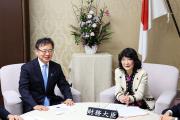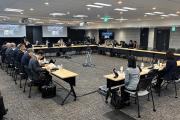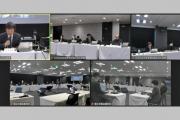The Ministry of Health, Labor and Welfare (MHLW) has issued a notice to relevant pharma groups asking that drugs currently under shipment restrictions be supplied with priority to Ishikawa Prefecture affected by the New Year’s earthquake. However, it stopped short of requesting the outright lifting of such curbs there.
The move came in response to a plea made by Keiji Nakamori, president of the Ishikawa Pharmaceutical Association, who met directly with Health Minister Keizo Takemi during his visit to the Ishikawa capital of Kanazawa on January 18.
During the meeting, Mr Nakamori explained that medicines were lacking in disaster-struck areas and sought emergency measures such as lifting shipment controls in Ishikawa to enable the securing of necessary drugs. The minister responded to this plea by instructing MHLW officials to appropriately take care of this matter.
On receiving this instruction, the MHLW issued a notice later in the day to the Federation of Pharmaceutical Manufacturers’ Associations of Japan (FPMAJ), the Federation of Japan Pharmaceutical Wholesalers Association (JPWA), and an association of drug distributors in Ishikawa. In the notice, the ministry stated that stakeholders in the quake-hit areas have voiced concerns over the stable supplies of ethical medicines and called on prioritized deliveries of shipment-restricted drugs in order to meet the demands of those regions.
The distributor association of Ishikawa and the JPWA had made a similar request to the FPMAJ on January 9, asking for prioritized drug supplies to the Hokuriku region in central Japan, including Ishikawa. The latest MHLW notification is intended to ensure that this request comes through.
Although the Ishikawa Pharmaceutical Association had sought the lifting of shipment restrictions, the MHLW’s notice was confined to asking the industry to prioritize supplies of the relevant products.
The MHLW said to Jiho on January 19, “As shipment controls are determined by respective makers according to their shipment volume and demand, it is difficult for the government to reverse this across the board.” The ministry asked for understanding, saying that the wording in the notice was the most it could use within its power.
Still, the MHLW expects that the notice will bring about actions almost equivalent to the lifting of curbed shipments, with the next focus to be on how manufacturers and wholesalers will respond to this call.











